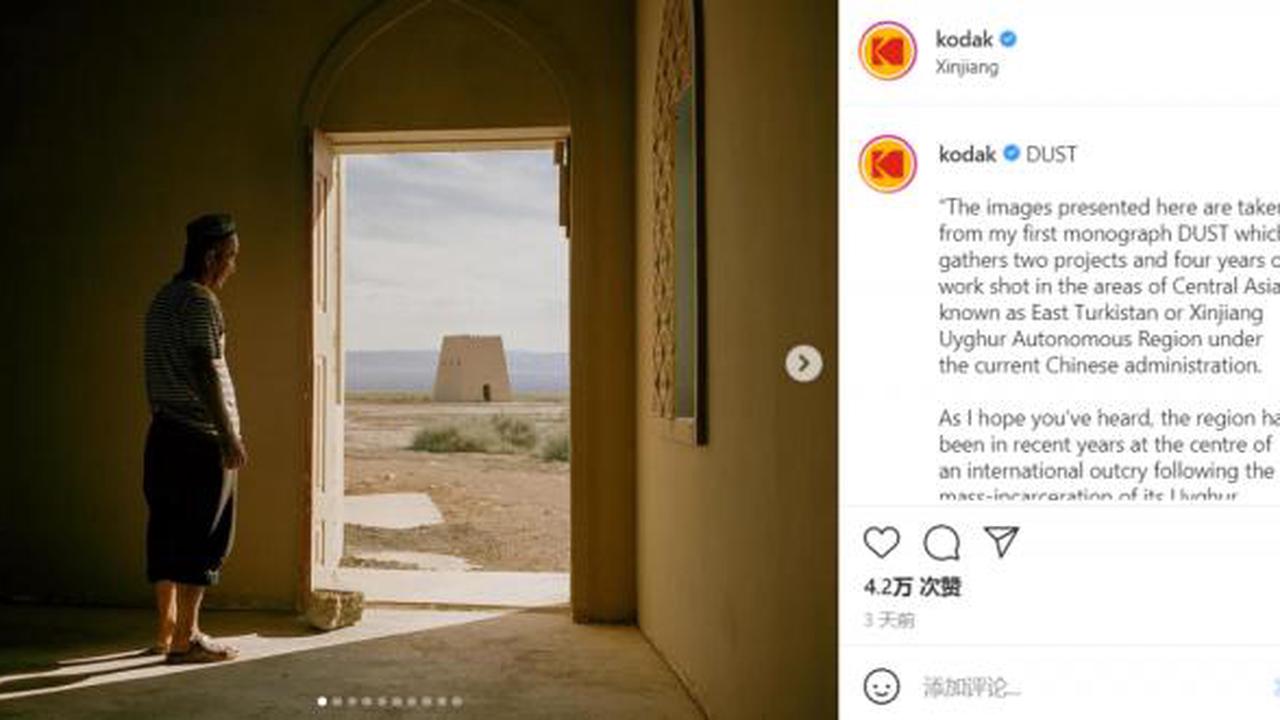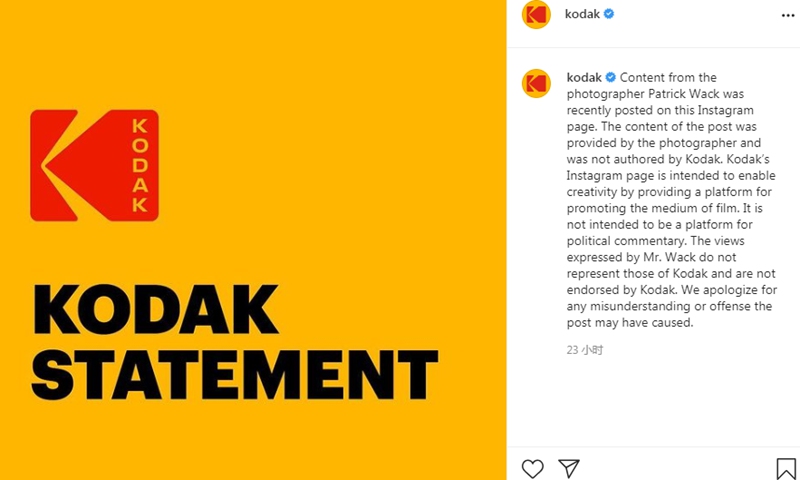Eastman Kodak has apologised for offending Chinese government supporters over an Instagram post that’s critical of mass arbitrary detention in the Xinjiang autonomous region.

The 10 photos by French photographer, Patrick Wack, captured on Kodak film in the north west Chinese territory, shows the ‘uneasy’ relationship between the oppressed Uyghurs ethnic locals and settlers from China’s majority Han ethnic group.
The Chinese Communist Party (CCP) backed activities in the Xinjiang region have been described by Human Rights Watch as ‘crimes against humanity’. Specific crimes committed against the Uyghurs include ‘imprisonment or other deprivation of liberty in violation of international law; persecution of an identifiable ethnic or religious group; enforced disappearance; torture; murder; and alleged inhumane acts intentionally causing great suffering or serious injury to mental or physical health, notably forced labor and sexual violence’.
The incarceration of over one million Uyghur and other minorities in forced re-education camps has been described as genocide. Yet despite the evidence showing grim events unfolding in Xinjiang, the CCP has repeatedly denied human rights abuse accusations and and become quite aggressive in accusing critics of interference in Chinese internal affairs.
Wack was approached by a Kodak social media manager, who posted the images with Wack’s caption stating the Xinjiang region had ‘been in recent years at the center of an international outcry following the mass incarceration of its Uyghur population and other Muslim minorities’.
The caption was the primary criticism of the Uyghur oppression – the images simply show landscapes and every day life in Xinjiang, and a part of a photo book called Dust. Wack told the New York Times that due to constant heavy surveillance, he was unable to photograph arrests or obvious signs of repression, ‘the only thing you can photograph is the grim atmosphere, and the change in the landscape.’
‘That’s what the book is about: showing how in only a few years the region radically changed and became another world,’ Wack said. ‘In 2016 it was still full of colours: You had golden domes and Muslim symbols everywhere and women wearing veils. In 2019, all of this had disappeared.’
In response to the subsequent online outrage from Chinese government supporters, and perhaps internal memos from CCP officials, Kodak went into damage control by promptly deleting the post and issuing an apology.

‘The content of the post was provided by the photographer and was not authored by Kodak. Kodak’s Instagram page is intended to enable creativity by providing a platform for promoting the medium of film. It is not intended to be a platform for political commentary. The views expressed by Mr. Wack do not represent those of Kodak and are not endorsed by Kodak. We apologise for any misunderstanding or offence the post may have caused.’
On its Chinese language website, Kodak stated it was a ‘supervision loophole’ in its content production system, which it promised to ‘review and correct’.
According to The Global Times, a Chinese state-run tabloid, Kodak issued another clarification on Chinese social media platform, WeChat.
‘For a long time, Kodak has maintained a good relationship with the Chinese government and has been in close cooperation with various government departments. We will continue to respect the Chinese government and the Chinese law.’
Wack states Kodak’s decision to delete the so-called political post has caused ‘upset’, as its film has been an essential tool to document newsworthy events that have a major impact on politics.
Historically, Kodak has taken positions on political matters when crimes against humanity are taking place. In 1986, for instance, Kodak famously joined a select group of American corporations protesting apartheid by withdrawing entirely from the South African market.
For what it’s worth, Inside Imaging scrolled through two years of Kodak Instagram posts and found nothing overtly political.
The economic powerhouse that is China has enough influence over international corporations that they frequently issue grovelling apologies after any perceived grievances by the CCP or its supporters. And Kodak ain’t the first photography company to desperately backpedal after upsetting the Chinese government.
Sony planned to launch a new camera on July 7, but delayed the international release due to the date being the 84th anniversary of Japan’s invasion of China. On Chinese social media platform Weibo, Sony said ‘due to our poor work arrangements, we have caused misunderstanding and confusion in the selection of the date. We apologise for this and cancel the related event.’
In February 2020, the Sony World Photography Awards censored three finalist’s pictures which covered the Hong Kong pro-democracy movement that’s fighting against the encroaching Chinese government. Inside Imaging interviewed American photojournalist, David Butow, who withdrew his series, Battleground Hong Kong, after the WPO removed five images due to their ‘sensitive nature’.
From the article:
The WPO didn’t divulge more information regarding why the photos are deemed sensitive, or who would make such a complaint. It’s likely that whoever complained is doing so on behalf of Chinese interests. It must also come from a position of power, as there is no recent record of WPO (or other prestigious contests) removing images due to political sensitivities.
‘I thought it was odd that what they were showing wasn’t even faithful to what their judges had selected,’ David said. ‘It’s not like I entered this project and they immediately said “oh, we really like this but there’s some pictures we can’t show”. The whole series was published in the shortlist, but at some point there was an intervention. I have no knowledge of who raised a concern, or what their motivations were, but my work was going to be taken out of context. It would be incomplete and didn’t reflect my intention of the project. That alone was enough for me to make the decision to withdraw.’
WPO is a London-based organisation, but has strong connections to China. It has an office in Shanghai, where it also runs the annual festival, Photofairs. WPO also licenses its travelling exhibition, which has visited China at least seven times. And, of course, the contest’s major sponsor, Sony, has a dependence on China, both for manufacturing and access to the huge Chinese market.
Outside the photo industry, there have been several high-profile apologies issued for things like showing support for democracy in Hong Kong, recognising Taiwan as sovereign nation, criticising events taking place in Xinjiang or other occupied regions like Tibet, or highlighting other sensitive issues.





Quite honestly it’s time that big corporations such as Kodak and others, started standing up to the CCP!
Otherwise the CCP will continue to do as it wishes and shut down any comment it doesn’t like!
China as a country and most of the people are great, but the CCP is not! They shut down any comment they regard as negative, much like the Soviet Union under Stalin.
The only way there will be change is if people continue to tell what is really happening and refuse to be silenced!
Well said Simon. The more the CCP are challenged and called out, the more likely it is they will take notice.
Profit before humanity . Not a Kodak Moment
Kodak learnt a lesson maybe when 1986 SAF, I am sure it was early 80’s with apartheid, Agfa and other took over their major share in the market.
Perhaps Sino Promise has an agreement about the Kodak brand now that says don’t rock the boat?!
Kodak = gutless, treasonous doormat. No longer dealing in Kodak products.